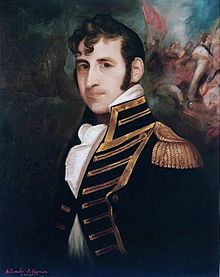The Garden of Years and Other Poems/Tripoli

One to ten of you lesser men—these are the odds we crave:
For the ring of the sword, at the cry to board, is a song that befits the brave.
Board and burn, that ye well may learn, how American tars atone:
Borrow ye may, but there dawns a day when we come to claim our own!
Tripolitan pirate and Turkish thief, they had harried her there on the sunken reef,
Plundered, and robbed, and stripped her crew, for such was Tripoli law:
Lowered her barred and star-set flag, and run to her peak their pirate rag,
For the shaming of William Bainbridge and the fame of Jussuf Bashaw!
They had towed the wreck to the haven’s neck, and under the castle’s guns,
And bound and jailed all them that sailed as the Philadelphia’s sons:
So the frigate lay in Tripoli Bay, by the Molehead batteries pinned,
And along her flank, in a watchful rank, the guardian gunboats grinned!
Out of the Gulf of Sidra’s gales, a brig and a ketch, with flattened sails,
Slid toward Tripoli harbor as the sun ahead went down,
And, by the forts of Jussuf Bashaw pinned like prey in a panther’s paw,
The captured frigate at anchor saw, in the curve of the pirate town.
And one of the pair had the peaceful air of a merchantman landward led,
And one of the two a Maltese crew, in fezzes of flaming red;
But they muttered on deck as they marked the speck of the flag that swung on high
Where the crimson bars and the silver stars had rippled against the sky!
Then a wind came out of the cool northwest, and lifted the ketch on a heaving crest,
Bulging her sails till the sea sang low at the touch of her slender prore,
And she leapt, with the joy of a living soul, through the narrow channel ’twixt reef and shoal,
And ran, like a racer, toward the goal of the tall black hull inshore!
But the brig lay to on the darkening blue of the offing, a mile outside,
And watched the ketch on the rippling stretch of the fort-girt harbor ride,
Till out of the light she slid from sight, tackle, and sails, and mast,
Undismayed, in the sombre shade that the hull of the frigate cast.
Now the staunch Sicilian pilot cried to them that leaned on the frigate’s side:
“This is the Stella of Malta, with her anchors swept away,
And her cables, too, to the very last, when the storm of yester night went past.
So we crave your leave to take a fast from your quarter until the day.”
“And what ye ask is an easy task” an officer made reply.
“Since ye have no line, I will send you mine, with leave in our lee to lie.”
So the ketch crept near to the frigate’s sheer, and, swung by the swirling tide,
Veered around, till her bowsprit ground on the Philadelphia’s side.

Then Stephen Decatur’s slender sword in the moonlight winked, as he thundered “Board!”
The hatches yawned on the ketch’s deck, and, quick as a man may turn,
Up from her hold, with a stirring shout, sixty American tars leapt out,
And mounted the frigate’s black redoubt like a wave that breaks astern!
And the startled night saw such a fight as none but the desperate make,
Blow on blow from foe to foe for the Philadelphia’s sake!
Cheer on cheer, as the end drew near, and a final charge, and then
The frigate lay in Tripoli Bay—an American ship again !
From twoscore ports the smoke-wreaths crept, and a single rocket skyward leapt
To tell the brig in the offing that Decatur’s work was done,
As the victors sprang to the ketch’s deck, and pulled away from the blazing wreck
That reddened the tide to the harbor’s neck, with news of the glory won!
And the slim flames struck from rail to truck, till the haven gleamed and glowed,
And the whole wide night was ablaze with light where Decatur’s oarsmen rowed;
While Tripoli’s sons from a hundred guns sent shot from the shelving shore.
And the frigate replied with her last broadside—an American ship once more!
But Stewart had seen that Decatur’s crew had done the work that they came to do,
And the boats of the brig lay close inshore, as the ketch out-won her way;
Watching, the oarsmen, drawing near, pause in their rowing, and, deaf to fear,
Rise to their feet with a stunning cheer in a harbor light as day!
Over the tide from the boats outside the answering cheer came in,
The hail of his mate who must watch and wait to the lad who may work and win!
And Decatur’s men, at their sweeps again, sped on from the panther’s paw,
While the frigate flamed, by her own reclaimed, at the gates of Jussuf Bashaw!
One to ten of you lesser men—these are the odds we crave:
For the ring of the sword, at the cry to board, is a song that befits the brave.
Board and burn, that ye well may learn how American tars atone:
Borrow ye may, but there dawns a day when we come to claim our own!
New York, 1902.
![]()
This work was published before January 1, 1930, and is in the public domain worldwide because the author died at least 100 years ago.
Public domainPublic domainfalsefalse
